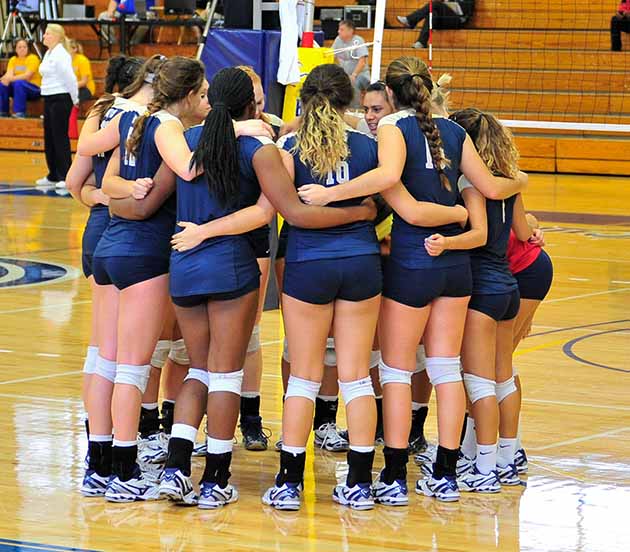Stress and the student athlete
HCC student athletes dealing with the pressure of a game.
What do you think of when you hear the term student athlete? For many, it is an image of a person that excels not only on the playing field but also in the classroom. Most people don’t realize that students who participate in intercollegiate sports have the potential to be at a greater risk for depression, anxiety and other mental health issues. Student athletes practice and compete as a team and individually to succeed at their sport. Successful athletes know that their game can only be as good as their attitude, focus and desire to win.
In addition to the normal developmental challenges that all college students face, student athletes face added pressures because of the commitment and participation level that college athletics demand. Research suggests that 10-15% of college athletes are at risk of developing mental health issues due to the increased stress and anxiety of participating in a college sport. This may lead to a diagnosis of depression, anxiety, substance abuse and eating disorders.
One source of pressure for student athletes is how they may prioritize their role/ identity. As they are referred, they are a student first and athlete second. For example, practices and competitions might interfere with attending class or doing homework, or at the very least create a time-management conflict. These issues can aunt student athletes as they learn to adapt to the multiple and often changing demands of college life. Adapting to be a member of a team can also have its challenges (and rewards). The nature of a team requires its members o participate actively and to adhere to a standard of group rules. For some student athletes, the group dynamic may be diffi cult to embrace with the mix of personalities that comprise their team.
Athletic performance is another area of stress and anxiety for the student athlete. If typical stress and anxiety symptoms present themselves, i.e., sleeplessness, loss of appetite, fatigue, etc., the student’s athletic performance will tend to suffer. Also, external pressures to perform well by coaches, parents and teammates can lead to poor performance. Injuries can also have a dramatic impact on a student athlete and can damage their self esteem and identity. too often we read about athletic careers ending before they even begin due to a serious injury which forever changes that individual’s future.
Most athletes can appreciate that some anxiety before competition can help improve performance. However, excessive anxiety can be debilitating to a student athlete. It can create problems with focus and concentration, fears about performance and a self deprecating attitude. Oftentimes, student athletes have been supported by many to get to where they are with both academics and sports and they don’t want to disappoint others. Student athletes face a multitude of stressors that can create or exacerbate present mental health issues.
Counseling can be helpful to student athletes. There may be reluctance to seek help because of a strong desire to be self-reliant or because of stigma associated with seeking help. Also, for many student athletes there might just not be enough time in the day. Counseling can help student athletes in areas of time management, develop positive coping skills, anxiety and stress reduction and working out interpersonal issues. It can be important for coaches, trainers, families and teammates to be aware of how mental health issues can impact both overall functioning and athletic performance and to encourage their student athlete to seek help when needed.


Katie • Apr 26, 2015 at 11:54 am
Perception is reality for most all of the fans, coaches, professors, friends, and family members of any student-athlete. People choose to see a situation in their own light, and more times than not are mistaken by overlooking some of the most obvious signs of stress and severe depression. To most, the image of a student-athlete is far from the reality that the student-athlete actually lives in.
-Former Big-Ten Student Athlete